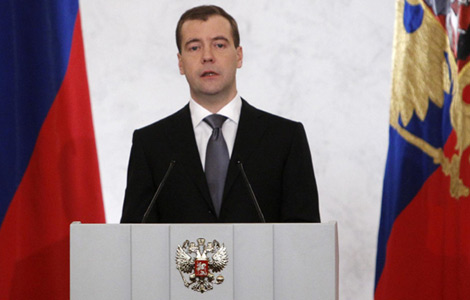Italy's austerity plan cleared
Updated: 2011-12-23 10:12
(Xinhua)
|
|||||||||||
MILAN, Italy - Italian Prime Minister Mario Monti's austerity plan won a final confidence vote in Senate on Thursday amid mounting calls for growth policies to follow.
The approval in the parliament's upper house came at the end of a marathon for the 30-billion-euro plan (about $39 billion) which has gone through heated debates and amendments in the past weeks.
Monti finally resorted to a confidence vote in both parliament chambers to speed up the package, which was passed by the lower house, or the Chamber of Deputies, last Friday.
The measures, particularly tax hikes and raising retirement age, have been contested sharply by trade unions, saying the package demanded too many sacrifices from honest workers instead of hitting tax evasion that amounts to some 17 percent of gross domestic product (GDP).
Analysts said that guild pressures have forced Monti, a highly respected economist and former European Union commissioner, to delay urgent growth measures including the liberalizations of closed industries such as pharmacies and taxis.
Italy's two main parties, the center-right People of Freedom and the center-left Democratic Party, have objected to the plan but finally backed it "for a sense of responsibility." Other political forces such as the Noarthern League - key partner of former Prime Minister Silvio Berlusconi's government - fiercely opposed.
Monti has seen his popularity decrease in opinion polls since he formed his cabinet of unelected technocrats one month ago after Berlusconi's resignation.
According to latest forecasts by national statistics and industrial agencies, the implementation of the austerity policies may push Italy deeper into a recession projected to begin in the current quarter.
In fact, the national statistics institute Istat said on Wednesday that the country's economy has contracted 0.2 percent in the third quarter of this year, while leading industrial association Confindustria predicted that GDP would shrink by 1.6 percent in 2012.
According to Marco Onado, an economics professor at Milan Bocconi University, "Italy technically is already in recession, which is likely to be serious as forecast by Confindustria."
Although the eurozone's third-largest economy would not have to seek any external aid technically, it is in urgent need of effective "common policy solutions at a European political level," he told Xinhua.
In his view, the package adopted by Monti's emergency cabinet was the only possible first step in such a crisis scenario to balance the budget, after which a second round of growth reforms is expected.
Italy's situation is certainly not positive for two main negative factors, a strategic management professor at Milan Politecnico University, Umberto Bertele, said.
"The first is less domestic demand, also due to this current package being the third reform since the previous Berlusconi's government," he told Xinhua.
The second is the decrease in export figures, which have been the real driving source of the Italian economy. The figures have shown a significant increase in the previous months but are now decreasing due to a global demand drop in the general worsening of the international economical picture, he added.
"Italy being linked a lot to interactions with other international countries, is more prone to market fluctuations," Bertele, who is also honorary president of the Politecnico MIP School of Management, noted.
"For sure, Italy is doing its part," he said.
Bertele also expected that Monti's government would apply as soon as possible a following phase of strong structural reforms to rescue the country from the current stagnant situation, as "timing is now crucial."
"But Europe particularly has to adopt more courageous solutions and its politicians make a stronger effort to implement substantial policies," he stressed.
Hot Topics
HIV/AIDS, Egypt protest, Thanksgiving, climate change, global economic recovery, home prices, high-speed railways, school bus safety, Libya situation, Weekly photos
Editor's Picks

|

|

|

|

|

|







